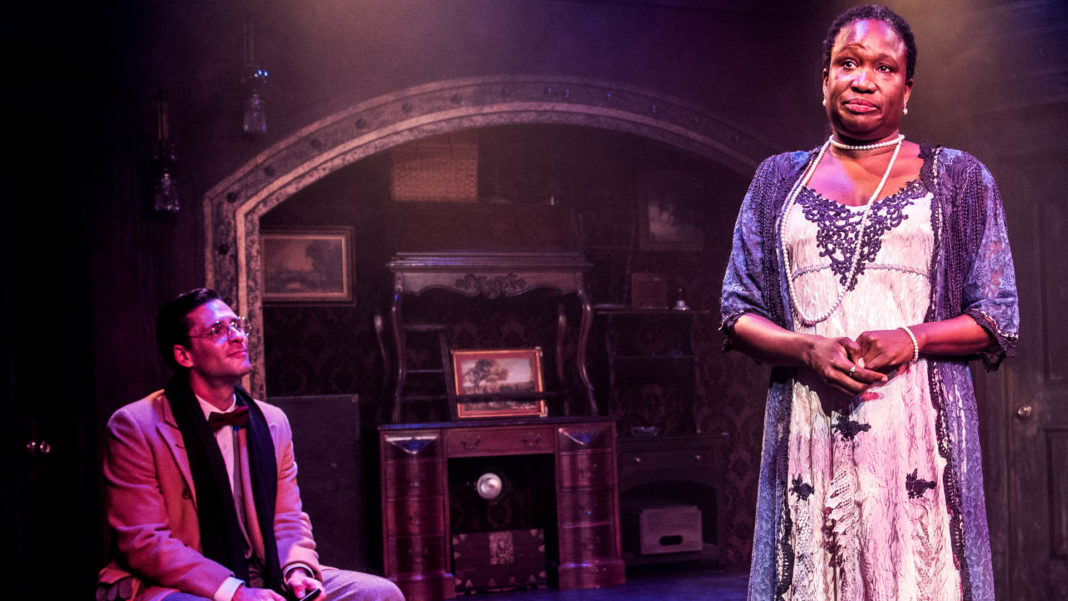As a veteran viewer of countless productions of the Kander & Ebb musical Cabaret, I always thought the heart and soul of this musical was found in Sally Bowles and Clifford Bradshaw. But in the current production of the show that Celebration Theatre is doing at the Lex Theatre, I found a new heart beating loudly. That was the role of Fraulein Schneider as played by June Carryl.

Carryl is not a household name (Failure: A Love Story and Romeo & Juliet on stage locally.) Nor is she the first person you would assume would be cast as the landlady renting out space to an American writer (Christopher Maikish) who falls in love with Kit Kat Club entertainer Sally Bowles (Talisa Friedman) and who falls in love herself with Herr Schultz (Matthew Henerson.) She’s not as old as most women who have played the part. And then there’s the fact that she’s African-American. If any of this surprises you, your surprise can’t possibly measure up to Carryl’s when she was asked by director Michael Matthews to do the show.
“I was shocked,” she says with a laugh. “He said this role and I went,” and she makes a loud gulping sound. “I think I was terrified. I think part of it was the political side of me which was I don’t want to be the betrayer. No matter how tragic the story, you can’t help but judge her a little. I think when you are a cultural other you get blamed for a lot of things. To be this Black woman who plays somebody who is a betrayer, I was terrified there would be no empathy. Plus I didn’t want to think of myself as a person who would fail. This character is so complicated and scary and challenging and I didn’t want to mess it up.”
For those unfamiliar with Cabaret, set in Berlin during the rise of the Nazi party, Fraulein Schenider falls in love with Herr Schultz, a Jew. When they get engaged a party is held to celebrate their upcoming wedding. But at the party one of the characters reveals himself to be a Nazi. Schneider calls off the engagement as it would jeopardize the security of her life. Playing a woman for whom survival is the key to most of her decisions was made easier for Carryl with one tip from her director.

“He didn’t even talk to me about history. He said, ‘what’s the love in the scene?’ When you step back and look at her, there is love. There is a kind of love with [tenant] Fraulein Kost – that motherly/sisterly love where they drive each other insane and still the fact is, she may threaten to call the police, but she never does. Cliff says he could give her 50 marks, she needs 100. He doesn’t saying anything and she responds on a human level to another person in need. It’s really easy when you find what in the scene is about love. What is kindness.”
Having a mixed race relationship amongst the two oldest characters in the musical actually allows for a more topical resonance according to Carryl. “Difference is just the beginning. We are talking about a society where the point was to erase all difference. That was the Nazi design. They did kill Blacks. They did kill gypsies, homosexuals, everyone who was different from them. What is says about what’s happening today is really powerful and it is an opportunity that Michael trusted would be there. That’s not the story. It’s not what it’s about, but it is a reality and it is there. That I got to be a part of that is exhilarating.”
As for Fraulein Schneider being the emotional center of the musical, Carryl never thought of the character that way.

“That’s what Michael said to me,” she reveals. “He took me aside and said very securely, ‘you are the emotional center of the show.’ I think that quite possibly it is because where Sally is exceptional in her own way, Fraulein Schneider and Herr Schultz are more the every day. They are kind of your every man. And ultimately they are the reasons Germany went the way that it did: Fraulein Schneider for not having the courage of her conviction and Herr Schultz for not being willing to see what was happening.”
The role does allow Carryl to sing all or parts of three songs and she has an obvious favorite.
“What Would You Do?,” she says without hesitation. “She proves that she has just enough courage to care about something and someone. She has to dare to step outside herself and let herself love. Then she sees all the people she must survive with. She knows what’s right, but she doesn’t know what’s survivable. If you have to choose between what’s right and surviving, that’s where most of us live – you chose survival.”
She also credits the show’s writers, John Kander, Fred Ebb and Joe Masteroff, for writing a show that will continue to resonate for decades to come.
“These people were geniuses. The text is so open and so simple. Any time people talk in terms of superiority/inferiority and who belongs and who doesn’t, any culture that grapples with those questions will gravitate to this text. We are born with all of this amazing beautiful stuff in us: whether different colors, genders or sexualities or have different thoughts. But we have this drive towards destruction in the programming. It’s heartbreaking.”
Production Photos by Matthew Brian Denman











